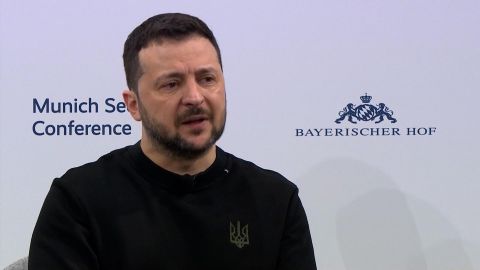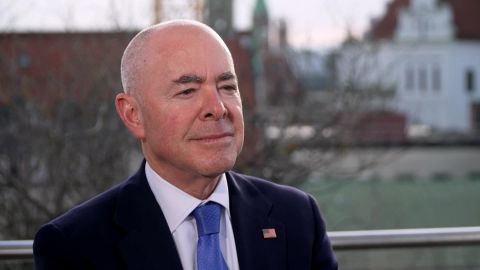Read Transcript EXPAND
CHRISTIANE AMANPOUR, INTERNATIONAL HOST: What about immigration? Because the Republicans, the very same Republicans that impeached you, they had insisted that the administration, of which you are cabinet secretary, add a tough immigration bill to any foreign aid bill, for Ukraine and the other countries, and then they sabotage that. What’s your analysis of that? How — you know, how much is that set back the cause of proper immigration reform?
MAYORKAS: So, it is a matter of unanimity that our system in the United States, our immigration system is broken. I was very privileged and honored to sit with a bipartisan group of senators to fashion legislative fixes that are overdue now for decades.
AMANPOUR: Yes.
MAYORKAS: It is, in fact, what the Republicans insisted upon. The bipartisan group of senators delivered. The question that everyone is asking is, was a solution actually desired or do people want the problem as a tool for politics? And regrettably, what we are seeing now is that the latter seems to carry the day more than the former.
AMANPOUR: And what will that mean actually on the border? You’ve been down there, the president’s been down there. You know, it’s such a huge thing, particularly in an election year. What does that mean for actually trying to tackle what even you all admit is, you know, just too many people coming across?
MAYORKAS: What it does is it’s a serious constraint on our ability to manage it, as it has been for some time. We can only do so much within a broken immigration system, a system that is fundamentally broken. And when we act, our actions — our executive actions are invariably challenged in the courts, depending on what we do. What we do drives who’s litigating, but not whether or not it is litigated. We rely on other countries as well. And what’s very important to understand is that the challenge that we are confronting is not unique to the United States.
AMANPOUR: No.
MAYORKAS: It is hemispheric and global in spoke — scope.
AMANPOUR: Is it unique to the United States that it just never gets fixed or are many of your allies facing the same issue? You keep saying it’s a fixed — it’s a broken immigration system. Why doesn’t it get fixed?
MAYORKAS: I think that it is a potentially unique that we haven’t been able to do anything legislative since 1996. That’s a long time.
AMANPOUR: Yes.
MAYORKAS: And the world has changed. And the dynamics of migration have changed. The demographics of the individuals whom we are encountering at the border are very different than they were 10 years ago. And so, unfortunately, politics are an impediment to a solution.
AMANPOUR: What other issues are you — is top of mind for you in your position here? What other major global issues that affect the United States are you going to be discussing with your counterparts?
MAYORKAS: So, we are very focused on a number of different types of threats, as well as opportunities. Uppermost in my mind right now is what we are doing with respect to the potential as well as the risks of artificial intelligence.
AMANPOUR: Yes.
MAYORKAS: To advance our mission as well as to protect against adverse nation states. I have a very important meeting with my counterpart from the People’s Republic of China in Vienna, following the Munich Security Conference. And so, we have a number of different mission sets within our portfolio that I am addressing with world leaders.
AMANPOUR: Do you feel — because China’s, obviously — you know, in the bigger picture, America seems to think its biggest threat comes from China. I mean, it’s trying to deal with Russia and Ukraine, it’s trying to deal with an explosive Middle East, but they all say that we need to pivot to China. What do you think your counterpart is going to be thinking in terms of the seriousness of the United States after all these shenanigans in Congress, after, you know, questioning aid to Ukraine? I mean, they must all be watching very closely.
MAYORKAS: I’m sure they are. The world watches the United States, because the United States is a leader. My counterpart is very focused on some of the challenges that we share. And one of them is fentanyl, the scourge of fentanyl. That is not exclusive to the United States, but is predominant in the United States. We want to tackle that challenge and we want to tackle it together. The president, our President Biden, met with President Xi and really opened up the aperture of a dialogue between the United States and China, and other cabinet members have brought their respective portfolios to the table with their Chinese counterparts and I am doing the same.
AMANPOUR: And given that this is an election year, not just in the United States, but in many, many countries around the world, do you think that there can be any progress made on the U.S immigration front or not? Or is it going to wait until after the election?
MAYORKAS: I am an unrelenting optimist, especially when one confronts a legislative imperative. A bipartisan group of senators reached an agreement. I am hoping that that crosses the finish line. And if not, in its current form, that modifications are made that don’t cause disrepair to really the fundamental principles of it, which is to make that asylum system more workable to meet the dynamics of today.
AMANPOUR: Do you have a personal reaction to what happened in Congress last week being impeached?
MAYORKAS: I will say this Christiane, I don’t let it distract me from the work. Would I have preferred that correctness had prevailed? Of course so. The fact that it did not, does not slow me down in doing the work that I’m tasked to do by the president of the United States.
About This Episode EXPAND
Volodymyr Zelensky discusses Alexey Navalny’s death and the state of the war on his country. Christiane speaks onstage in Munich with NATO’s Secretary General Jens Stoltenberg, Estonia’s Prime Minister Kaja Kallas, and Republican Senator Pete Ricketts. The first Cabinet Secretary to be impeached since 1876, Christiane spoke with Mayorkas in Munich, his first interview since the vote.
LEARN MORE

